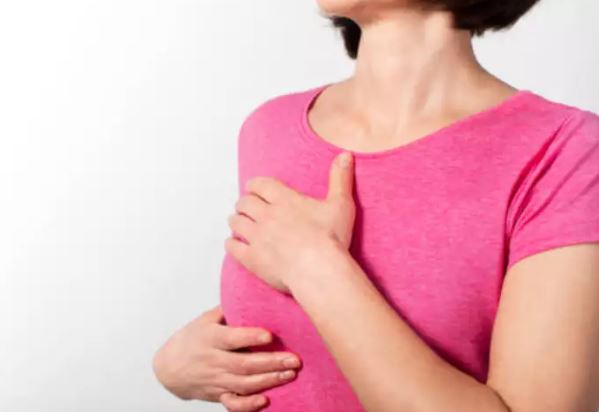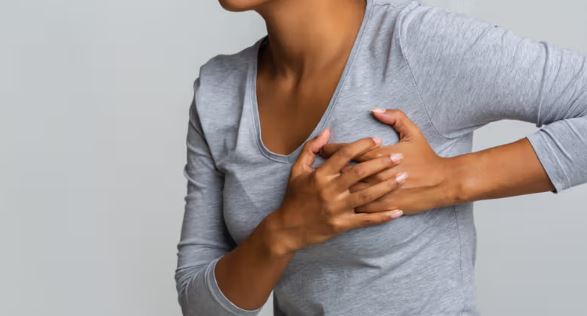Lifestyle
What causes breast pain and when to go to the doctor

Breast pain, also known as mastalgia, is a common complaint among women and can have various causes. It is a condition characterized by discomfort, tenderness, or pain in one or both breasts.
It can vary in severity and may be cyclic or non-cyclic, depending on hormonal fluctuations or other factors.
Mastalgia is a common concern among women and can be caused by various factors, including hormonal changes, breast cysts, fibrocystic changes, muscle strain, or underlying medical conditions.
Understanding the potential triggers and knowing when to seek medical attention is essential for proper management of the disease.
When hormones cause pain in the breast
Fluctuations in estrogen and progesterone levels during the menstrual cycle can lead to breast tenderness and discomfort, typically occurring in the days leading up to menstruation. This pain often occurs cyclically, correlating with the menstrual cycle. This hormonal influence can result in swelling, inflammation, and sensitivity in the breasts, typically peaking in the days leading up to menstruation and subsiding afterward.
Breast pain due to cysts
Breast cysts, fluid-filled sacs within breast tissue, can cause breast pain known as mastalgia. These cysts often lead to localized tenderness, discomfort, or a feeling of fullness in the affected area. The pain may vary in intensity and may be exacerbated by hormonal changes during the menstrual cycle. While breast cysts are typically benign, they can cause discomfort and require evaluation by a healthcare professional for proper diagnosis and management.
Breast pain can happen due to fibrocystic changes; know what it is
Fibrocystic breast changes involve the development of non-cancerous lumps or areas of thickened tissue in the breasts. Mastalgia associated with fibrocystic changes may manifest as cyclic or non-cyclic pain, often exacerbated by hormonal fluctuations. While fibrocystic changes are benign, they can cause discomfort and require evaluation by a healthcare professional for appropriate management and reassurance.
Pain caused due to injury
Physical activities or trauma to the chest area can cause muscle strain or injury, resulting in breast pain. Impact or repetitive movements during exercise, sports, or accidents can strain the chest muscles, leading to discomfort or tenderness in the breast tissue. While breast pain from muscle strain is typically temporary and resolves with rest and gentle stretching, severe or persistent pain should prompt evaluation by a healthcare professional to rule out underlying injury or medical conditions.
Breastfeeding
Breastfeeding can cause breast pain, often due to engorgement, blocked milk ducts, or improper latch technique. Engorgement occurs when the breasts become overfilled with milk, leading to swelling, tenderness, and discomfort. Blocked milk ducts can cause localized pain and inflammation, often accompanied by a firm lump in the breast. Improper latch technique during breastfeeding can also cause nipple pain and soreness. Consulting a lactation specialist or healthcare provider can help address these issues.
Do not delay visiting a doctor if you see the following signs
While breast pain is often benign and temporary, there are instances when it’s advisable to seek medical evaluation:
Persistent or severe pain: If breast pain persists beyond the menstrual cycle or becomes severe, it’s important to consult a healthcare professional to rule out underlying conditions.
New or unusual symptoms: Any new or unusual breast symptoms, such as lumps, changes in breast size or shape, nipple discharge, or skin changes (e.g., redness, dimpling), should prompt a visit to the doctor for further evaluation.
Pain associated with breastfeeding: Nursing mothers experiencing persistent or worsening breast pain, along with other symptoms such as fever, redness, or flu-like symptoms, should seek prompt medical attention for possible mastitis or other breastfeeding-related issues.
History of breast cancer or high-risk factors: Women with a personal or family history of breast cancer or other high-risk factors should be vigilant about any changes or abnormalities in their breasts and consult a healthcare provider promptly if concerns arise.
Pain interfering with daily activities: If breast pain significantly interferes with daily activities, work, or sleep, it’s advisable to seek medical evaluation for appropriate management and relief.
Worsening symptoms: If breast pain worsens over time or is accompanied by other concerning symptoms, such as unexplained weight loss, fatigue, or persistent cough, it may indicate an underlying medical condition requiring attention.








